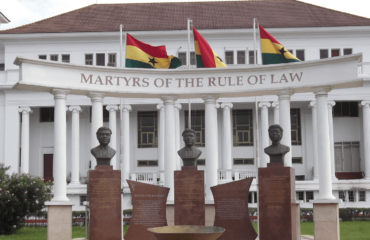
Contextual Overview
The 1992 Constitution of Ghana establishes a framework for governance rooted in the separation of powers. Article 88(1) designates the Attorney General as the legal advisor to the government and the office responsible for public prosecutions. Additionally, the Attorney General serves as the Minister of Justice, tasked with overseeing the administration of justice. While this arrangement was historically influenced by colonial governance structures, it is now ripe for review in the context of modern democratic governance.
The 1992 Constitution of Ghana is lauded for its comprehensive framework, which seeks to ensure checks and balances, as well as the separation of powers within government. However, like any legal document, it is not without ambiguities. One intriguing constitutional debate centers on whether the Ministry of Justice can be hived off as a standalone entity from the Attorney-General’s Department.
This issue stems from the Constitution’s provisions on amendments. Articles 290 and 291 provide clear guidelines on how entrenched and non-entrenched provisions of the Constitution can be amended. Entrenched provisions require a referendum under Article 290(4), reflecting their fundamental importance to the structure and spirit of governance. Non-entrenched provisions, on the other hand, follow a relatively less stringent amendment process under Article 291.
The Constitutional Silence
The 1992 Constitution does not explicitly indicate whether separating the Ministry of Justice from the Attorney-General’s Department falls under an entrenched or non-entrenched provision. This ambiguity has sparked a debate among legal scholars, politicians, and constitutional experts.
The Attorney-General’s Department is a critical institution, acting as both the government’s chief legal advisor and the primary enforcer of legal proceedings on behalf of the state. By contrast, the Ministry of Justice is often seen as a broader policymaking body tasked with overseeing the administration of justice. Some argue that separating these two roles could enhance efficiency, eliminate conflicts of interest, and improve accountability.
Entrenched vs. Non-Entrenched Provisions
At the heart of the debate lies a procedural question: does creating a standalone Ministry of Justice amount to amending an entrenched provision? Article 290 outlines the strict process for altering entrenched provisions, including the need for a national referendum. Examples of entrenched provisions include those relating to the sovereignty of Ghana, fundamental human rights, and the independence of key state institutions.
While the Constitution clearly enumerates these entrenched provisions, it is silent on whether the structure of the Attorney-General’s Department falls within this category. Some experts contend that restructuring the department would fundamentally alter the executive’s composition and functions, making it an entrenched matter. Others argue that it is an administrative decision that does not touch on the Constitution’s core principles, and thus could proceed under the less rigorous Article 291 process.
The Case for Separation
Advocates for separating the Ministry of Justice from the Attorney-General’s Department highlight several benefits:
- Efficiency and Specialization: Splitting the roles would allow each institution to focus on its core mandate without the burden of conflicting priorities.
- Conflict of Interest: The Attorney-General often serves as both a legal advisor to the government and a prosecutor in cases involving the state. Separating these roles could mitigate potential conflicts of interest.
- Strengthening Rule of Law: A standalone Ministry of Justice could focus on broader justice reforms, such as access to justice, legal aid, and judiciary independence.
Challenges and Counterarguments
However, opponents argue that such a move could complicate governance and lead to unnecessary duplication of resources. Additionally, some worry that creating a standalone Ministry of Justice might dilute the powers of the Attorney-General, potentially weakening the state’s ability to enforce laws effectively.
Moreover, the procedural ambiguity surrounding the amendment process creates a legal gray area. If the matter is treated as an entrenched provision and subjected to a referendum, it would require significant public and political buy-in. If treated as non-entrenched, critics might challenge the legitimacy of the process in court, further complicating the issue.
International Context: Lessons from Other Nations
Ghana is not alone in grappling with the structure of its justice and legal systems. Other countries have faced similar debates, offering insights that could inform the conversation:
- United Kingdom: In the UK, the roles of the Attorney General and the Ministry of Justice are distinct. The Attorney General serves as the chief legal advisor to the Crown and government, while the Ministry of Justice oversees justice administration. The separation allows for greater independence in the policymaking and operational aspects of the justice system.
- United States: In the US, the Attorney General heads the Department of Justice, combining both roles into one. However, there are mechanisms to mitigate conflicts of interest, such as the use of independent prosecutors in cases involving government officials.
- Nigeria: Nigeria follows a similar structure to Ghana, where the Attorney-General also serves as the Minister of Justice. However, there have been calls for reform, citing conflicts of interest and inefficiencies in handling justice administration.
- Canada: Canada separates the roles of the Minister of Justice and the Attorney General, though the same individual holds both titles. To address potential conflicts of interest, the Attorney General’s prosecutorial functions are guided by strict principles of independence.
Each model reflects a balance between efficiency, accountability, and the rule of law. The question for Ghana is how to adapt these lessons to its unique constitutional and political context.
A Constitutional Test Case
Ultimately, this debate underscores the need for constitutional clarity. If Ghana is to pursue such a reform, it may require a broader national conversation about the role and structure of the executive branch. It could also serve as a test case for interpreting the scope of entrenched provisions under the 1992 Constitution.
The decision to hive off the Ministry of Justice from the Attorney-General’s Department is not merely an administrative or legal matter. It is a constitutional challenge that cuts to the heart of governance, accountability, and the rule of law in Ghana. As such, it demands thoughtful deliberation, informed by both local realities and international best practices.



